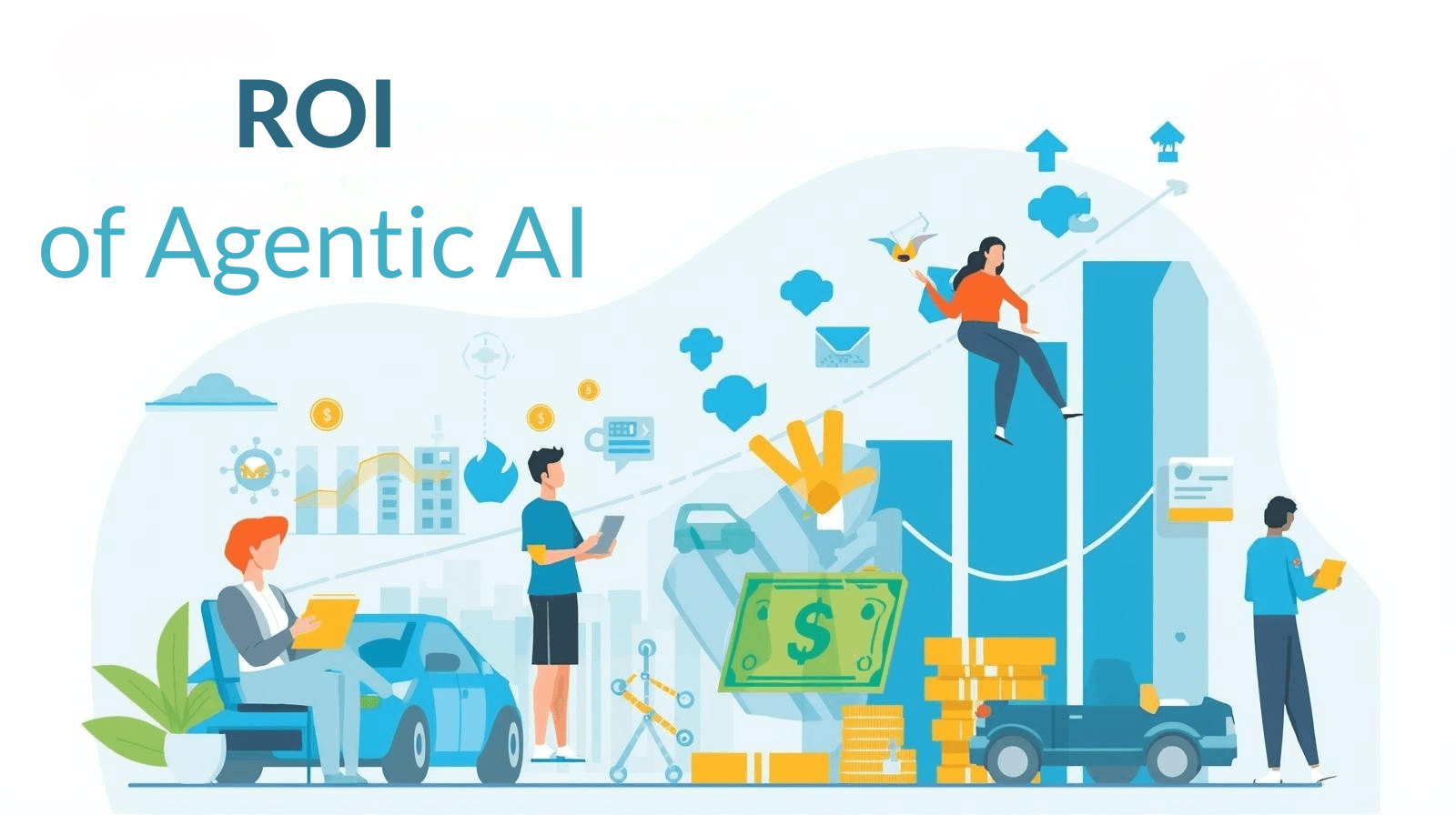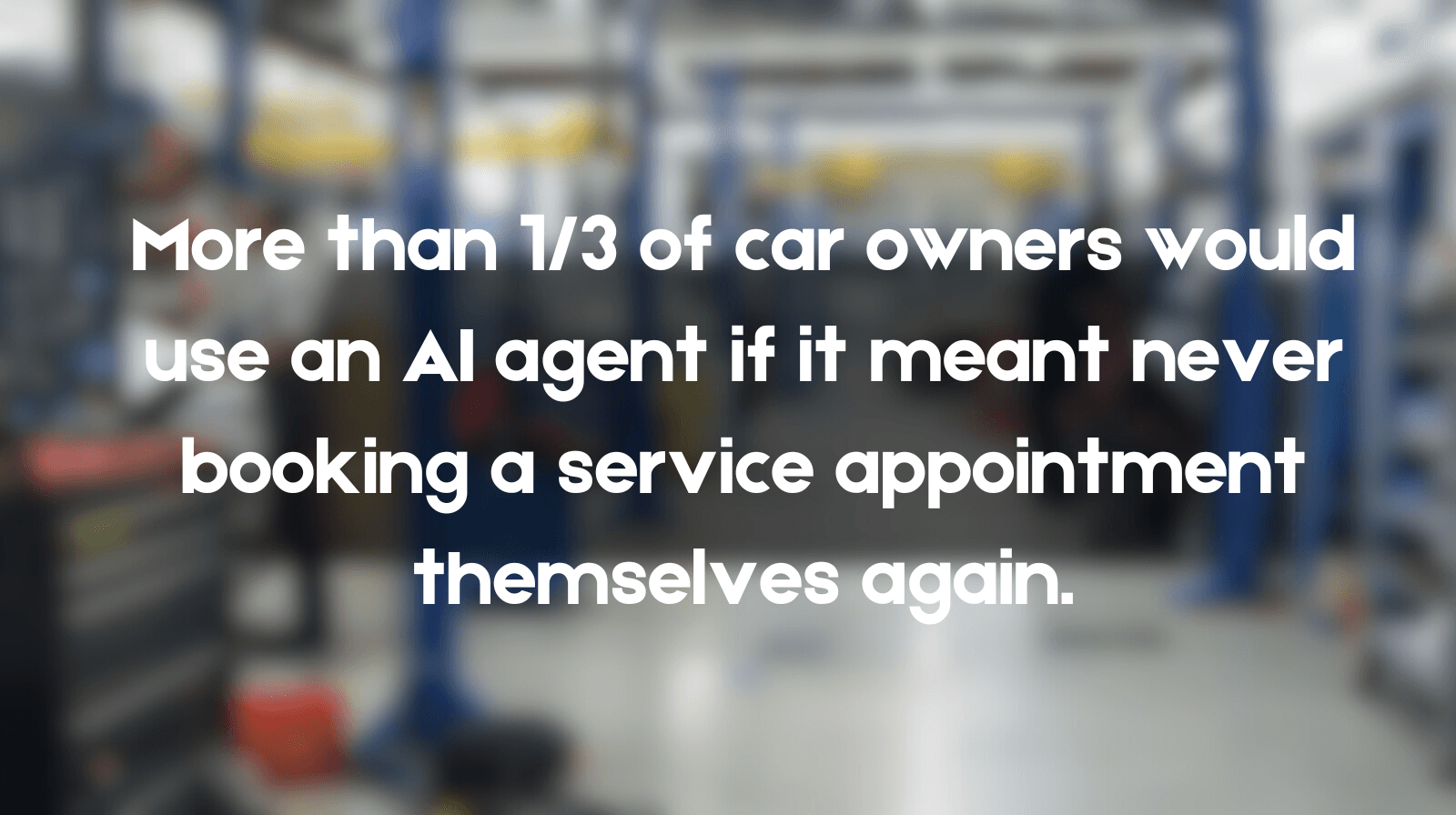

Measuring Agentic AI ROI in Automotive
The automotive industry is no stranger to transformation. Over the past decade, dealerships, service centers and independent shops have had to adapt to the rise of connected vehicles, the acceleration of electrification and shifting consumer expectations shaped by digital-first experiences. At the same time, margins have grown tighter, technician shortages remain a pressing issue and customer loyalty is harder to secure in a marketplace where convenience often trumps brand affinity.
Within this challenging environment, agentic artificial intelligence (AI) has emerged as one of the most promising innovations. Unlike traditional automation tools or simple chatbots that rely on scripted responses, agentic AI is built around autonomous artificial intelligence agents capable of independently setting goals, planning actions and executing tasks with minimal supervision. These systems can carry out entire processes end-to-end, including answering a missed customer call, scheduling a service appointment, confirming the booking and sending a personalized reminder, without needing a handoff to a human employee. The business impact of agentic AI in the automotive sector is already being seen in improved operational efficiency, cost savings and enhanced customer experiences.
The question many automotive leaders are now asking is not “What is agentic AI?” but “How do we measure its impact on our bottom line?” It is one thing to recognize the potential of automation and autonomy; it is another to tie that technology to hard numbers that prove return on investment (ROI). In an era where every dollar must be justified, calculating agentic AI ROI has become crucial. To unlock the full potential of AI initiatives, organizations need comprehensive frameworks to evaluate the success of both agentic AI and generative AI projects. Choosing use cases with clear ROI metrics is essential for demonstrating the tangible value of agentic AI investments. Additionally, rising costs related to AI adoption, such as ongoing computing and storage expenses, must be considered when evaluating ROI.
According to McKinsey’s State of AI 2024 survey, 78% of organizations now use AI in at least one business function, and adoption of generative and agentic AI tools nearly doubled year over year. Many organizations are rapidly adopting enterprise AI and gen AI technologies, which are transforming core business functions and enabling new levels of automation and efficiency.
Agentic AI is also reshaping business operations by integrating AI into core processes for strategic advantage. Executives report that these technologies are delivering measurable business value, and executives report achieving ROI from AI investments within the first year, highlighting the scale and effectiveness of enterprise AI deployment. With this acceleration, companies that measure ROI effectively can move from experimentation to sustained financial performance.
You can read our full comparison of Agentic Voice AI over IVR for Auto Shops here.
Where Agentic AI Creates Measurable Value for Automotive
Agent deployment is becoming a strategic initiative for automotive businesses seeking to gain a competitive edge. In the highly competitive automotive industry, every interaction with a potential or existing customer carries substantial value. From service inquiries to repair bookings, even small inefficiencies can translate into lost revenue, missed appointments and lower customer satisfaction.
Agentic AI addresses these challenges by acting as a highly capable extension of your team. Autonomous agents are advanced, task-specific AI entities capable of managing entire workflows independently, transforming how core business processes are executed.
Unlike simple automation, agentic AI agents can autonomously manage complex workflows, such as answering calls, handling scheduling, confirming appointments and offering upsell recommendations — all without human intervention. These agents are also able to autonomously handle complex customer inquiries, including routing, analyzing sentiment and providing personalized responses to improve customer satisfaction and reduce workload.
AI agents are specifically designed to identify and address individual customer needs, leading to improved satisfaction, higher retention and more tailored experiences. This shift reduces the reliance on human agents for routine and intricate tasks, allowing human agents to focus on higher-value interactions.
Using AI agents to automate and streamline service workflows further enhances operational efficiency. Intelligent automation serves as the foundation for these advanced workflows, enabling multiple agents to work collaboratively and manage different aspects of the customer journey.
Understanding where these AI agents can create measurable value is the first step toward quantifying ROI and building a business case for adoption. Agentic AI is not about replacing staff but amplifying their capacity and enhancing employee capabilities while capturing revenue that would otherwise be lost. To realize these benefits, organizations must deploy agents strategically within business processes as part of a broader shift toward an agent-native infrastructure. In the automotive space, its value falls into four core areas:
1. Revenue Capture and Conversion
Missed phone calls are a persistent problem in automotive service centers and dealerships. Each missed call could represent a lost oil change, tire rotation or even a major repair order. The average dealership misses 158 service calls per month, equating to as much as $97,200 in lost revenue monthly and over $1.17 million annually. Agentic AI ensures no inquiry is left unanswered, converting missed opportunities into booked appointments and driving additional upsells. By capturing more revenue and appointments, dealerships can increase their market share in a highly competitive environment.
2. Capacity and Throughput
Every bay in a service center is an opportunity for revenue, but underutilization due to inefficient scheduling limits profitability. Agentic AI agents optimize calendars by reducing no-shows, filling canceled slots and ensuring technicians have a steady flow of work. Eliminating these inefficiencies increases daily throughput and maximizes each bay’s revenue potential. Agentic AI can also support inventory optimization, further improving operational efficiency by ensuring the right parts and materials are available when needed.
3. Cost-to-Serve Reduction
Front-desk staff spend hours each day answering routine questions, rescheduling appointments and sending reminders. With AI agents taking on these repetitive interactions, staff are freed to focus on higher-value work such as upselling or providing in-person support. This lowers the cost-to-serve per customer while maintaining responsiveness. More than one-third of car owners would use an AI agent if it meant never booking a service appointment themselves again, signaling strong customer acceptance of automation.
4. Retention and Lifetime Value
Agentic AI nurtures long-term relationships. Automated but personalized reminders, seasonal service promotions and post-visit follow-ups keep customers engaged and returning.

Key Metrics to Measure Agentic AI ROI
Measuring the ROI of agentic AI demands a systematic approach to quantify both direct and indirect benefits. Automotive businesses can no longer rely solely on traditional metrics like labor hours saved. They must capture the full spectrum of value, including increased appointment bookings, reduced no-shows, improved technician utilization and long-term customer retention.
Establishing clear performance metrics is essential to track the effectiveness of agentic AI and ensure that all relevant outcomes are measured. Agentic AI enhances decision-making by autonomously analyzing data and adapting strategies to optimize business outcomes.
By identifying and tracking these key metrics, organizations can create a comprehensive view of how AI agents impact revenue, efficiency and customer satisfaction. These metrics not only justify the initial investment but also highlight areas for ongoing optimization, helping shops and dealerships continuously improve performance while maximizing ROI from agentic AI deployments. It is also important to consider hidden costs, such as training, integration, ongoing maintenance and compliance, when evaluating ROI to ensure a realistic assessment.
The impact of agentic AI becomes real when translated into quantifiable metrics. Automotive businesses should prioritize the following measures:
Captured Revenue
This is the most direct way to measure ROI. Track the incremental revenue attributed to agent interactions, such as the value of appointments booked from calls that would have gone unanswered. A dealership capturing 200 additional service appointments per month at an average ROI of $250 translates into $50,000 in incremental revenue.
Conversion Rate Lift
Measure the change in conversion from inquiry to appointment after deploying agentic AI. If previously only 40% of calls resulted in a booking and that number climbs to 60% with AI involvement, the financial impact is immediate.
Appointment Capture Rate and No-Show Reduction
AI agents confirm appointments and send reminders to reduce no-shows. A reduction of just ten percent in missed appointments can save a mid-sized shop tens of thousands in lost service revenue annually.
Technician Productivity
By smoothing scheduling and reducing idle time, AI agents increase the number of jobs technicians can complete per week. Even one additional job per bay per day can create hundreds of thousands of dollars in annual incremental revenue.
Labor Cost Savings
Agentic AI can cut routine call and scheduling time by up to 20%, enabling advisors to focus on customer care and sales. The financial value of labor reallocation adds to overall ROI.
Customer Retention Lift
AI-driven reminders and personalized offers can lift service retention rates. A five percent increase in retention has been shown in multiple industries to improve profitability by 25% or more, a powerful multiplier effect in automotive.
Time-to-Resolution and Handle Time
Agentic AI shortens average handling time, improving customer experience while allowing more calls or messages to be managed per day. Faster resolution translates into higher satisfaction and loyalty.

Measurement Methodology — Practical Steps
Calculating ROI from agentic AI is a structured process that combines careful baseline measurement, controlled testing, agent deployment and ongoing optimization. Large language models (LLMs) play an important role in enabling the evolution from basic AI tools to sophisticated, agent-based automation systems that optimize workflows and employee capabilities.
Automotive businesses must approach this systematically to ensure results are both accurate and actionable. Without systematic measurement and management, the benefits of agentic AI can remain largely untapped.
A well-defined methodology, supported by robust governance frameworks, enables organizations to quantify the incremental impact of AI agents, separate it from existing trends and capture the financial and operational benefits that would otherwise remain invisible. Here’s a step-by-step framework for automotive businesses:
Step 1: Define the Baseline
Before deploying AI agents, collect at least three to six months of historical data. Track call volumes, booking conversion rates, no-show rates, technician throughput and customer retention. This baseline provides the reference point for all ROI calculations.
Step 2: Run a Controlled Rollout
Start small. Deploy agentic AI at a single location or with a subset of staff and compare performance against a control group. This lets you to isolate the impact of AI and demonstrate early wins before scaling across multiple sites.
Step 3: Attribute Results Accurately
Attribution is crucial. Use call-tracking systems, booking IDs and customer relationship management (CRM) integrations to ensure revenue can be directly tied to agent-driven interactions. Without precise attribution, ROI calculations risk being underestimated.
Step 4: Model Indirect Impact
Not all value is immediate. Factor in the indirect effects of AI deployment, such as technician-hours freed by better scheduling or incremental parts sales from additional service visits, secondary benefits that often rival direct captured revenue in importance.
Step 5: Calculate Payback and Return
Add up all costs, including implementation, integration, licensing and cloud usage fees. Compare against direct and indirect revenue gains to calculate simple payback (in months) and internal rate of return (IRR). Automotive businesses often see ROI materialize within six to twelve months.
Step 6: Govern and Refine
Agentic AI is not static. Monitor performance, review transcripts and fine-tune prompts to improve intent detection and customer satisfaction. Establish governance processes to ensure the system continues to deliver measurable value as customer behaviors and business needs evolve.
What Realistic ROI Looks Like
The ROI from agentic AI in automotive can be both immediate and long-term. Early adopters report recapturing tens of thousands of dollars within the first month by converting missed calls into appointments. Agentic AI transforms service operations by optimizing customer interactions, streamlining support tasks, and enabling staff to focus on higher-value consultative roles.
Over time, improvements in conversion, reduced no-shows and technician productivity gains compound. A service center that increases throughput by one job per day per bay could generate several hundred thousand dollars in incremental annual revenue.
Integrating external data sources such as weather forecasts allows agentic AI to further optimize scheduling and logistics, improving efficiency and reducing costs. Longer-term, improved customer retention amplifies results. According to McKinsey research, agentic AI in advanced industries, including automotive, has the potential to generate $450–650 billion in additional annual revenue by 2030, representing a five to ten percent uplift across the sector.
The realistic picture of ROI is a mix of captured revenue, higher operational efficiency and customer lifetime value. When these dimensions are measured together, businesses often surpass their initial investment in a matter of months while setting themselves up for sustained profitability.
Revmo AI: Reliable ROI for Your Automotive Business
For businesses seeking a purpose-built solution, Revmo AI offers conversational AI agents designed specifically for automotive operations. These agents answer missed calls, capture appointments, confirm bookings and send proactive reminders to reduce no-shows.
Our automotive case studies show immediate and substantial ROI, with dealerships recovering thousands in missed-call revenue within weeks of deployment. By focusing exclusively on the automotive industry, our platform delivers tailored solutions that accelerate adoption and maximize measurable returns.
If your shop or dealership struggles with missed calls, inefficient scheduling or staff overwhelmed by repetitive tasks, Revmo AI provides a proven path to unlocking agentic AI ROI with measurable, bottom-line impact. Book a demo with us to learn more.

Written By Ryan Louis
CEO and Co-Founder
Ryan is a seasoned executive and entrepreneur with more than 18 years of technology consulting, industry and start-up experience.


